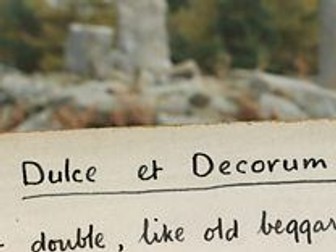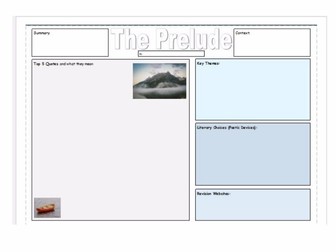WW1 Poetry Unit Year 8 Term 1. Whole SOL: 30 Numbered PPs, Worksheets, Two Assessments and Overview
<p>A complete all-through WW1 Poetry Unit that covers Dulce et Decorum Est (Owen), The Deserter (Frankau), In Flanders Fields (McCrae), Who’s for the Game? (Pope), The Call (Pope), Fall In (Begbie) and a final group work on either The Soldier, My Boy Jack, The Beau Ideal, Anthem for Doomed Youth or The Death Bed.</p>
<p>Lesson 1 - Introduction to WW1<br />
Lesson 2 - Revision poster on WW1<br />
Lesson 3 - Introduction to Dulce et Decorum Est<br />
Lesson 4 - Annotations on Dulce et Decorum Est<br />
Lesson 5 - Response to Dulce et Decorum Est<br />
Lesson 6 - Introduction to The Deserter<br />
Lesson 7 - Annotations on The Deserter<br />
Lesson 8 - Response to The Deserter<br />
Lesson 9 - Introduction to In Flanders Fields<br />
Lesson 10 - Annotations on In Flanders Fields<br />
Lesson 11 - Response to In Flanders Fields<br />
Lesson 12 - Interim Assessment (1/2 PEEs response to one poem)<br />
Lesson 13 - Introduction to Who’s for the Game?<br />
Lesson 14 - Annotations on Who’s for the Game?<br />
Lesson 15 - Response to Who’s for the Game?<br />
Lesson 16 - DIRT Lesson on Interim Assessment<br />
Lesson 17 - Introduction to The Call<br />
Lesson 18 - Annotations on The Call<br />
Lesson 19 - Introduction to Fall In<br />
Lesson 20 - Annotations on Fall In<br />
Lesson 21 - Planning a comparagraph between The Call and Fall In<br />
Lesson 22 - Writing up a comparagraph between The Call and Fall In<br />
Lesson 23 - Finall Assessment (2/3 comparagraphs on two poems studied)<br />
Lesson 24 - Homework Gallery Day<br />
Lesson 25 - Poetry Introduction to one final poem (different per group of five/six students)<br />
Lesson 26 - Poetry Annotations and Presentation Planning of one final poem<br />
Lesson 27 - Poetry Presentations on one final poem<br />
Lesson 28 - Revision Poster on Key Themes linking all poems together<br />
Lesson 29 - War Horse and Key Themes<br />
Lesson 30 - War Horse and Comprehension</p>
<p>If you wish to complete lessons 29 and 30, you will need to grab a copy of the film War Horse.</p>
<p>My class is set in 5 table units of six students so an mention of tables means around 5/6 pupils.</p>
<p>Please let me know if you have any questions or feedback. I use these lessons myself so am always striving to improve. Enjoy!</p>




